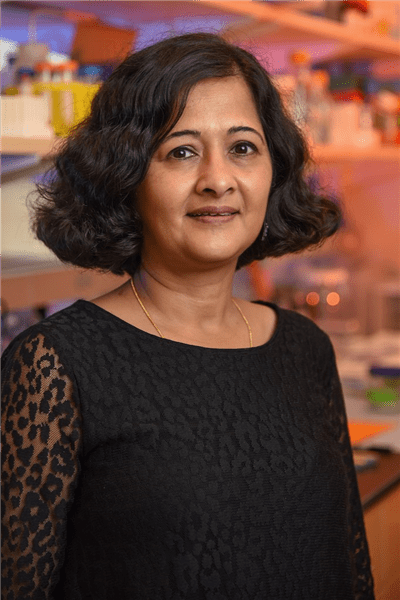
Uma Sankar, PhD
L. Kenneth & Paula D. Knoebel Professor of Cellular & Integrative Physiology
Professor of Anatomy, Cell Biology & Physiology
- Phone
- (317) 274-7870
- Address
-
MS-5035
ANAT
IN
Indianapolis, IN - PubMed:
-

| Year | Degree | Institution |
|---|---|---|
| 2003 | PhD | The Ohio State University |
| 1997 | MS | The Ohio State University |
| 1992 | BSC | Kerala Agricultural University |
The Sankar lab focuses on the role of calcium/calmodulindependentprotein kinase (CaMK) signaling in mammalian development and disease. We recently discoverednovel roles for calcium/calmodulin?dependent protein kinase kinase 2 (CaMKK2) in both the anabolic andcatabolic pathways of bone remodeling, and are actively pursuing projects investigating osteoblast and osteoclast differentiation, survival and function. Our long?term objective is to understand how theCaMKK2?CaMK signaling cascade integrates with the endocrine and paracrine mechanisms regulating skeletalhomeostasis with the goal of identifying bone anabolic therapeutics in combating age and malignancy?inducedosteoporosis. Recently, we were funded by the DoD to develop the pharmacological inhibition of CaMKK2 as anefficacious bone anabolic therapeutic strategy in fracture healing. Further, through an American Cancer Societyfunded project, we are investigating CaMKK2 inhibition as a “dual hit” strategy to control cancer cell growth whileprotecting bone from androgen?deprivation therapy?mediated osteoporosis in patients with advanced?stageprostate cancer. As CaMKK2 inhibition has a growth?restricting effect on prostate cancer itself, its inhibition couldbe developed as a therapy that will prevent therapy?induced bone loss and devastating fractures while restrictingtumor burden, addressing two key issues in the “palliative care and symptom management” of patients withadvanced?stage prostate cancer. Trainees will be trained in several in vitro and in vivo techniques. These includeprimary cell isolation from mice, cell culture, biochemistry, molecular and cell biology techniques as well as kinaseassays, enzyme kinetics, retro and lentivirus mediated genetic manipulations, mitochondrial assays, flowcytometry, histochemistry, small molecule screening, assessment of tumor burden by live imaging techniques, etc.